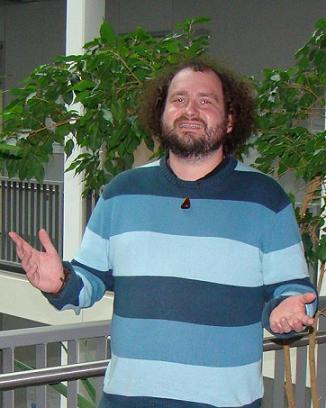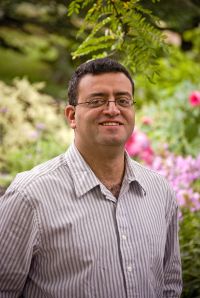iDB Workshop 2014
The 6th International Workshop with Mentors on Databases, Web and Information Management for Young Researchers
July 31th - August 2nd, 2014
Speakers (tentative)
Sanjay Madria (Missouri University of Science and Technology) [detail]
Wolf-Tilo Balke (University of Hannover, Germany) [detail]
Tao Mei (Microsoft Research Asia, China) [detail]
Bongki Moon (Seoul National University, Korea) [detail]
Mohamed Mokbel (University of Minnesota, USA) [detail]
Invited Talks
Title: Sensor Cloud
Speaker: Sanjay Madria, Missouri University of Science and Technology, USA

Abstract: Traditional model of computing with wireless sensors imposes restrictions on how efficiently wireless sensors can be used due to resource constraints. Newer models for interacting with wireless sensors such as Internet of Things and Sensor Cloud aim to overcome these restrictions. In this talk, I will present the Missouri S&T sensor cloud which enables different networks, spread in a huge geographical area to connect together and be used by multiple users at the same time on demand basis. I will also present the concept of virtual sensors, which is at the core of our sensor cloud architecture. We further discuss how virtual sensors assist in creating a multi user environment on top of resource constrained physical wireless sensors and can help in supporting multiple applications on-demand basis. In addition, I will present ideas on scheduling and allocation of tasks in a sensor cloud. Also, I will discuss an energy efficient privacy and data integrity preserving data aggregation algorithm for sensor cloud applications.
Biography: Sanjay Kumar Madria received his Ph.D. in Computer Science from Indian Institute of Technology, Delhi, India in 1995. He is a full professor and Associate Chair- Research in the Department of Computer Science at the Missouri University of Science and Technology (formerly, University of Missouri-Rolla, USA) and site director, NSF I/UCRC center on Net-Centric Software Systems. He has published over 200 Journal and conference papers in the areas of mobile data management, Sensor computing, and cyber security and trust management. He won three best papers awards including IEEE MDM 2011 and IEEE MDM 2012. He is the co-author of a book published by Springer in Nov 2003. He serves as steering committee members in IEEE SRDS and IEEE MDM among others and has served in International conferences as a general co-chair (IEEE MDM, IEEE SRDS and others), and presented tutorials/talks in the areas of mobile data management and sensor computing at various venues. His research is supported by several grants from federal sources such as NSF, DOE, AFRL, ARL, ARO, NIST and industries like Boeing, Unique*Soft, etc. He has also been awarded JSPS (Japanese Society for Promotion of Science) visiting scientist fellowship in 2006 and ASEE (American Society of Engineering Education) fellowship at AFRL from 2008 to 2012. In 2012-13, he was awarded NRC Fellowship by National Academies. He has received faculty excellence research awards in 2007, 2009, 2011 and 2013 from his university for excellence in research. He served as an IEEE Distinguished Speaker, and currently, he is an ACM Distinguished Speaker, and IEEE Senior Member and Golden Core awardee.
Title: Conceptual Views for Entity-Centric Search
Speaker: Wolf-Tilo Balke, University of Hannover, Germany

Abstract: With the widespread use of the Web as primary information source, entity-centric search has become a common task for many people, with product search arguably being most prominent – in fact accounting for about 20% of Web queries. In this context, typical entity types are mobile phones, movies, and books, but could of course also be people, news items or events.
The retrieval of entity data has always been a core application of database systems and querying an entity's attributes can be efficiently done using declarative languages like SQL. but database methodology alone is becoming less and less adequate to master this task. Entities are no longer characterized by structured data alone but to a large extent also by semi-structured and unstructured information. For example, besides technical specifications, a typical shopping website features detailed textual product descriptions, expert reviews, and a large variety of user-generated content such as ratings, tags, and opinions. While modern database systems offer extensive technical capabilities for storing a large variety of data types (e.g., text documents, XML documents, and even multimedia content), the means for querying this data remain very limited.
Moreover, today's retrieval tasks more and more focus also on conceptual aspects of entities, which often are not directly expressed by attributes. For instance, while users might want to find a 'thrilling' novel, unfortunately there is no 'suspense factor' attribute in today's online book stores. Consequently, entity-centric search suffers from a growing semantic gap between the users’ intended queries and the database’s schema. In the talk, we will propose the notion of conceptual views, an innovative extension of traditional database views, which aim to uncover those query-relevant concepts that are often only reflected by unstructured data related to some entities. We will also take a look at promising techniques for mining conceptual information and discuss open issues.
Biography: Wolf-Tilo Balke currently holds the chair for information systems at Technische Universität Braunschweig, Germany, and serves as a director of L3S Research Center at Leibniz Universität Hannover, Germany. Before, he was the associate research director of L3S and a research fellow at the University of California at Berkeley, USA. His research is in the area of databases and information service provisioning, including personalized query processing, retrieval algorithms, preference-based retrieval and ontology-based discovery and selection of services. In 2013 Wolf-Tilo Balke has been elected as a member of the Academia Europaea. He is the recipient of two Emmy-Noether-Grants of Excellence by the German Research Foundation (DFG) and the Scientific Award of the University Foundation Augsburg, Germany. He has received his B.A and M.Sc degree in mathematics and a PhD in computer science from University of Augsburg, Germany.
Title: User-Centric Social Multimedia Analysis
Speaker: Tao Mei, Microsoft Research, China

Abstract: Increasingly rich and large-scale social multimedia data (including text, images, audio, video) are being generated and posted to social networking and media sharing websites. Researchers from multidisciplinary areas are developing methods for processing social multimedia and employing such rich multi-modality data for various applications. We present a few recent advances in the nascent area of user-centric social multimedia analysis. Specifically, this talk will focus on sensing users from the heterogeneous, complex, and dynamic social multimedia. We will introduce four elements in the loop of sensing users-user profile, context, multi-modal input, and interactivity. In particular, we will introduce: 1) estimation of user profile, 2) accurate and comprehensive estimation of a mobile user's geo-context from phone-captured photos, and 3) personalized mobile recommendation based on context information. In addition to the recently developed social multimedia applications, I will also share thoughts on current challenges and future directions.
Biography: Tao Mei is a Lead Researcher with Microsoft Research, Beijing, China. He received the B.E. degree in automation and the Ph.D. degree in pattern recognition and intelligent systems from the University of Science and Technology of China, Hefei, China, in 2001 and 2006, respectively. His current research interests include multimedia information retrieval and computer vision. He has authored or co-authored over 100 papers in journals and conferences, 10 book chapters, and edited three books. He holds a dozen U.S. granted patents and more than 20 in pending. Dr. Mei was the recipient of several paper awards from prestigious multimedia conferences and journals, including the IEEE Circuits and Systems Society Circuits and Systems for Video Technology Best Paper Award in 2014, the IEEE Trans. on Multimedia Prize Paper Award in 2013, the Best Student Paper Award at IEEE VCIP in 2012, the Best Paper Awards at ACM Multimedia in 2009 and 2007, etc. He is an Associate Editor of the IEEE Trans. on Multimedia, Multimedia Systems, and Neurocomputing. He is a senior member of the ACM and the IEEE.
URL: http://research.microsoft.com/en-us/people/tmei/
Title: Addressing I/O Bottleneck in OLTP Systems with Flash Memory
Speaker: Bongki Moon, Seoul National University, Korea

Abstract: I/O has been a bottleneck in OLTP systems, which process a large number of small random I/O operations. A common practice is using a large disk farm to exploit I/O parallelism. However, this raises other concerns such as wasted resources and increased energy consumption. In this talk, I will present research endeavors we have made in the past years to overcome the I/O crisis in OLTP systems with flash memory. They include In-Page Logging (IPL), Flash as Cache Extension (FaCE) and Transactional FTL (X-FTL).
This work was done jointly with Prof. Sang-Won Lee at Sungkyunkwan University.
Biography: Bongki Moon is a professor of Computer Science & Engineering at Seoul National University. He joined the faculty of the University in 2013. Prior to that, he had been a professor of Comptuer Science at the University of Arizona from 1997 till early 2013, and he had worked for the research divisions of Samsung Electronics and Samsung Advanced Institute of Technology from 1985 till 1990. He received his PhD degree in Computer Science from University of Maryland, College Park, in 1996, and his MS and BS degrees in Computer Engineering from Seoul National University in 1985 and 1983, respectively.
Tutorials
Title: SpatialHadoop: A MapReduce Framework for Spatial Data
Speaker: Mohamed F. Mokbel, University of Minnesota

Abstract: The talk is about SpatialHadoop; a full-fledged MapReduce framework with native support for spatial data. SpatialHadoop is a comprehensive extension to Hadoop that injects spatial data awareness in each Hadoop layer, namely, the language, storage, MapReduce, and operations layers. In the language layer, SpatialHadoop adds a simple and expressive high level language for spatial data types and operations. In the storage layer, SpatialHadoop adapts traditional spatial index structures, Grid, R-tree and R+-tree, to form a two-level spatial index. SpatialHadoop enriches the MapReduce layer by new components for efficient and scalable spatial data processing. In the operations layer, SpatialHadoop is already equipped with three basic operations, range query, kNN, and spatial join as case studies. Other spatial operations can also be added following a similar approach. We will also discuss various projects that we are carrying, based on SpatialHadoop, to manage NASA satellite data, Twitter data, and OpenStreetMap data.
Biography: Mohamed F. Mokbel (Ph.D., Purdue University, MS, B.Sc., Alexandria University) is an Associate Professor in the Department of Computer Science and Engineering, University of Minnesota as well as the founding Technical Director of KACST GIS Technology Innovation Center, Umm Al-Qura University, Saudi Arabia. His research interests include the interaction of GIS and location-based services with database systems and cloud computing. His research work has been recognized by four best paper awards at IEEE MASS 2008, IEEE MDM 2009, SSTD 2011, and ACM MobiGIS Workshop 2012, and by the NSF CAREER award 2010 (the most prestigious award given to junior faculty from NSF, USA). Mohamed was the program co-chair for the ACM GIS conference from 2008 to 2010 and the workshop co-chair from 2012 to 2014. Mohamed is an ACM Senior member, IEEE Senior member, a founding member of ACM SIGSPATIAL in 2008, and an elected Chair of ACM SIGSPATIAL 2014-2017. For more information, please visit: www.cs.umn.edu/~mokbel.